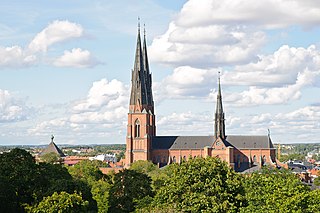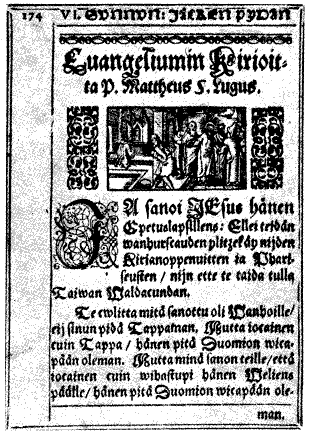
The Church of Sweden is an Evangelical Lutheran national church in Sweden. A former state church, headquartered in Uppsala, with around 5.4 million members at year end 2023, it is the largest Christian denomination in Sweden, the largest Lutheran denomination in Europe and the third-largest in the world, after the Ethiopian Evangelical Church Mekane Yesus and the Evangelical Lutheran Church in Tanzania.

The early Vasa era is a period in Swedish history that lasted between 1523–1611. It began with the reconquest of Stockholm by Gustav Vasa and his men from the Danes in 1523, which was triggered by the event known as the Stockholm Bloodbath in 1520, and then was followed up by Sweden's secession from the Kalmar Union, and continued with the reign of Gustav's sons Eric XIV, John III, John's son Sigismund, and finally Gustav's youngest son Charles IX. The era was followed by a period commonly referred to as the Swedish Empire, or Stormaktstiden in Swedish, which means "Era Of Great Power".

Cuius regio, eius religio is a Latin phrase which literally means "whose realm, their religion" – meaning that the religion of the ruler was to dictate the religion of those ruled. This legal principle marked a major development in the collective freedom of religion within Western civilization. Before tolerance of individual religious divergences became accepted, most statesmen and political theorists took it for granted that religious diversity weakened a state – and particularly weakened ecclesiastically-transmitted control and monitoring in a state. The principle of "cuius regio" was a compromise in the conflict between this paradigm of statecraft and the emerging trend toward religious pluralism developing throughout the German-speaking lands of the Holy Roman Empire. It permitted assortative migration of adherents to two religious groups, Roman Catholic and Lutheran, eliding other confessions.

Olof Persson, sometimes Petersson, better known under the Latin form of his name, Olaus Petri, was a clergyman, writer, judge, and major contributor to the Protestant Reformation in Sweden. His brother, Laurentius Petri, became the first Evangelical Lutheran Archbishop of Sweden.
Crypto-Calvinism is a pejorative term describing a segment of those members of the Lutheran Church in Germany who were accused of secretly subscribing to Calvinist doctrine of the Eucharist in the decades immediately after the death of Martin Luther in 1546. It denotes what was seen as a hidden Calvinist belief, i.e., the doctrines of John Calvin, by members of the Lutheran Church. The term crypto-Calvinist in Lutheranism was preceded by terms Zwinglian and Sacramentarian. Also, Jansenism has been accused of crypto-Calvinism by Roman Catholics.

The Catholic Church in Sweden is part of the worldwide Catholic Church in communion with the Pope in Rome. It was established by Archbishop Ansgar in Birka in 829, and further developed by the Christianization of Sweden in the 9th century. King Olof Skötkonung is considered the first Christian king of Sweden.
Confessional Lutheranism is a name used by Lutherans to designate those who believe in the doctrines taught in the Book of Concord of 1580 in their entirety. Confessional Lutherans maintain that faithfulness to the Book of Concord, which is a summary of the teachings found in Scripture, requires attention to how that faith is actually being preached, taught, and put into practice. Confessional Lutherans believe that this is a vital part of their identity as Lutherans.

Petrus Kenicius was Archbishop of Uppsala in the Church of Sweden from 1609 to his death.

Anna Vasa of Sweden was a Swedish princess heavily involved in the politics of that country and of Poland. She was starosta of Brodnica and Golub. The youngest child of King John III of Sweden and Catherine Jagiellon, she was close to her brother Sigismund Vasa, King of Poland (1587–1632) and King of Sweden (1592–99). Raised a Catholic, Anna converted to Lutheranism in 1584. Though she had several suitors, she remained unmarried.

The Polish–Swedish union was a short-lived personal union between the Polish–Lithuanian Commonwealth and the Kingdom of Sweden between 1592 and 1599. It began when Sigismund III Vasa, elected King of Poland and Grand Duke of Lithuania, was crowned King of Sweden following the death of his father John III. The union ended following a civil war in Sweden in which he lost the crown to his uncle, who eventually became Charles IX. Sigismund afterwards returned to Warsaw and pursued a war against his former realm.

Religion in Sweden has, over the years, become increasingly diverse. Christianity was the religion of virtually all of the Swedish population from the 12th to the early 20th century, but it has rapidly declined throughout the late 20th and early 21st century.

Ericus Erici Sorolainen (1546–1625) was a Finnish Lutheran bishop, a Bishop of Turku from 1583 to 1625 as the successor to Paulus Juusten; and the administrator of the Diocese of Viipuri.
The Augsburg Confession, also known as the Augustan Confession or the Augustana from its Latin name, Confessio Augustana, is the primary confession of faith of the Lutheran Church and one of the most important documents of the Protestant Reformation. The Augsburg Confession was written in both German and Latin and was presented by a number of German rulers and free-cities at the Diet of Augsburg on 25 June 1530.

The Reformation in Sweden is generally regarded as having begun in 1527 during the reign of King Gustav I of Sweden, but the process was slow and was not definitively decided until the Uppsala Synod of 1593, in the wake of an attempted counter-reformation during the reign of John III (1568–1592).

Events from the year 1600 in Sweden
The Liturgical Struggle was the name for the period from 1574 until 1593 in Sweden, when there was a struggle about the confession of faith and liturgy of the Church of Sweden, brought about by the attempts of King John III of Sweden to make the Swedish church take a mediating position between Catholicism and Protestantism by holding only certain doctrines and practices which could be established immediately in either the Word of God or patristic writings, similar to what had once been imposed on the Lutheran areas in Germany during the Augsburg Interim. The struggle began in 1574, when the king introduced some new rules in the liturgy which were not in accordance with Lutheran doctrine and practice, followed by his publication of the Liturgia Svecanae Ecclesiae catholicae & orthodoxae conformia commonly called the "Red Book", which re-introduced a number of Catholic customs. The Liturgical Struggle ended with the Lutheran confession of faith at the Uppsala Synod in 1593.
Christopherus Stephani Bellinus was a Swedish priest, and Member of the Clergy of the Riksdag of the Estates of Sweden.
Stephanus Olai Bellinus (1570–1629), also called Gaulander and Suecus, was a Swedish prelate, and writer, including on Latin poetry. He was a son of Olaus Stephani Bellinus, and nephew to Christopherus Stephani Bellinus, and Johannes Stephani Bellinus. Stephanus Olai Bellinus assisted at the consistorium majus of bishop Johannes Rudbeckius, and was a preacher at the Riksdag of the Estates in 1604, and at the synod of the Church of Sweden in 1620. After studies at the University of Wittenberg, Bellinus completed his Doctorate in 1593. Bellinus was the last dean of the Diocese of Västerås.

Johannes Stephani Bellinus was a Swedish prelate and vicar in Enköping, Sweden.













